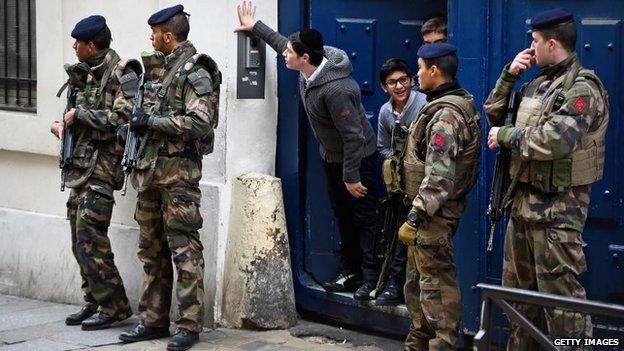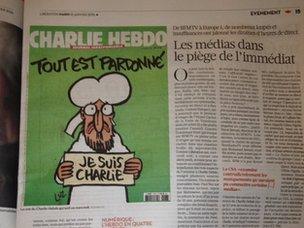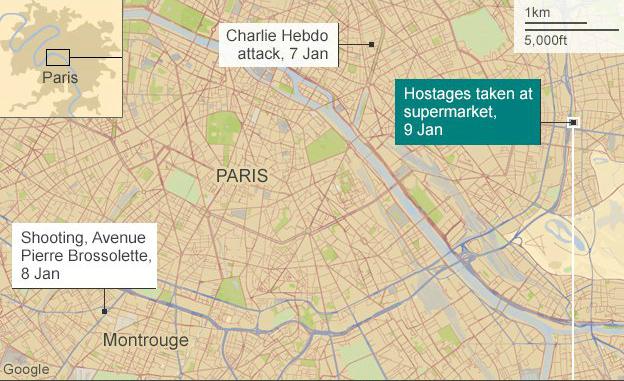France attacks: War with terrorism not Islam, PM Valls says
- Published
New mobile phone footage shows the Kouachi brothers opening fire on police
French PM Manuel Valls has said his country is at war with extremism and terrorism - but not with Muslims.
He told the French National Assembly that the Islamist gunmen who murdered 17 people in Paris had wanted to kill the "spirit of France", but had failed.
He was speaking after funeral ceremonies were held for seven of the people who died in last week's attacks.
This week's edition of the magazine targeted by the gunmen is to show a cartoon depicting the Prophet Muhammad.
Charlie Hebdo's previous depictions of the Prophet are said to to have prompted the attack on its offices which left 12 people dead, including the satirical magazine's editor and four other cartoonists.
The cartoon shows the Prophet weeping while holding a sign saying "Je suis Charlie" ("I am Charlie") - a slogan widely used following the attack on the magazine to express support - under the headline "All is forgiven".
(An image incorporating the cartoon appears lower in this article. Some people may find it offensive)

Hugh Schofield in Paris on the new edition:
There's the full-page cartoon of a weeping Muhammad on the front cover, but inside there are no more caricatures of the Prophet.
There are plenty - in the paper's characteristic scurrilous vein - of Muslim extremists. In one cartoon, two terrorists are seen ascending to heaven and asking: "Where are the 70 virgins?" In the background, the murdered staff at Charlie Hebdo are enjoying an orgy.
An editorial thanks the millions of people who have declared themselves as Charlie in the past few days - but it says it wants no more of the past insinuations that by provoking Muslims, it has somehow brought trouble on itself.

French lawmakers - meeting in the National Assembly for the first time since the events of last week - observed a minute's silence for the victims before singing the national anthem, the Marseillaise.
Members of France's National Assembly held a minute's silence before singing the national anthem
Mr Valls told them the huge unity demonstrations attended by millions across France on Sunday were a "magnificent response" to the violence, before adding: "We are at war against jihadism and terrorism... but France is not at war against Islam and Muslims."
He announced a series of measures that "draw on the lessons" from last week's attacks, including creating "specific quarters" for jihadists in prisons and tighter surveillance of the internet and social media.
"We must respond to this exceptional situation with exceptional measures," said the prime minister, but ruled out "exceptional measures which deviate from the principles of law and values".
France's defence ministry has deployed 10,000 troops at sites including synagogues, mosques and airports in response to the attacks.

Soldiers were deployed to protect sensitive sites, including schools
Top honour
At a ceremony at police headquarters in central Paris, French President Francois Hollande honoured the three police officers who died.
Mr Hollande posthumously bestowed France's top honour, the Legion d'Honneur, on the three officers - Franck Brinsolaro, Ahmed Merabet and Clarissa Jean-Philippe - whose coffins were draped in the French flag.
The BBC's Jeremy Bowen reports from Jerusalem, as funerals are held for four men killed in the attack on a Parisian kosher supermarket
The officers "died so that we may live in freedom", he said at the ceremony. "They died carrying out their duty with courage, bravery, dignity. They died as police officers."
At the same time, the four Jewish men killed at a kosher supermarket - Yoav Hattab, Philippe Braham, Yohan Cohen and Francois-Michel Saada - were buried at the Har HaMenuhot cemetery in Jerusalem.
Israeli Prime Minister Benjamin Netanyahu, among the hundreds attending the Jerusalem funerals, told mourners the victims' lives had been "cut down by hatred".
Three million copies
The front cover of the edition of Charlie Hebdo, due to be published on Wednesday, has been published widely in advance by French media.
Charlie Hebdo editor-in-chief Gerard Biard comforted Renald 'Luz' Luzier, who drew the latest cover, at a news conference
Francois Hollande awarded the three dead police officers the Legion d'Honneur - France's highest honour, as Fergal Keane reports
Outside France, the Washington Post, Germany's Frankfurter Allgemeine, Corriere della Sera in Italy and the UK's Guardian are among publications to show the cartoon.
Very few outlets in the Middle East and North Africa are running the image. But the Iranian news agency Tabak carries a blurred version with only the words "All is forgiven" visible above it.
Three million copies of Wednesday's edition - including versions in languages including English, Arabic and Turkish - are being printed. Normally only 60,000 are sold each week.
Survivors of the massacre have been working on the magazine from the offices of the French daily newspaper Liberation.
Editor-in-chief Gerard Biard told reporters: "We are happy to have done it and happy to have been able to do it, to have achieved it. It was tough. The front page... was complicated to put together, because it had to express something new, it had to say something relating to the event that we had to deal with."

The cartoon appears in Liberation, which has been hosting the Charlie Hebdo team since the attack
The three days of violence in Paris began after brothers Said and Cherif Kouachi attacked the magazine's office. They shouted "We have avenged the Prophet Muhammad" after the shootings.
The brothers were later killed by French security services after a stand-off in a town north of Paris.
Separately, Amedy Coulibaly - whom investigators have linked to the brothers - killed the four men at the kosher supermarket on Friday, apparently before police stormed the building. Coulibaly is also believed to have shot dead the policewoman the day before.
His partner Hayat Boumeddiene is now thought to be in Syria. She has been identified as a suspect by French police, although she left France before the attacks.
In another development, investigators in Bulgaria say a Frenchman arrested there on 1 January, Fritz-Joly Joachin, had been in touch with one of the Kouachi brothers.
He was first detained on a European arrest warrant issued by France following allegations by his wife that he had kidnapped their son, Bulgarian officials say.
A later arrest warrant was issued on charges of participating "in an organised crime group whose aim was the organisation of terrorist acts", Bulgarian public prosecutor Darina Slavova told AFP news agency.

Kosher supermarket victims

Yohan Cohen, 20, worked at the Hypercacher supermarket. Witnesses say both Yohan and Yoav Hattab were shot after seizing a Kalashnikov belonging to Amedy Coulibaly, but the gun was empty.
Philippe Braham, 45, worked for an IT company. His children went to a Jewish school in Montrouge, not far from where a policewoman was murdered by Coulibaly.
Yoav Hattab, 21, a student in Paris, was the son of the chief rabbi of Tunis and lost his aunt in a 1985 gun attack on a synagogue on the Tunisian island of Djerba.
Francois-Michel Saada, 63, was retired and had been married for more than 30 years. His two children both live in Israel.


How the attacks unfolded (all times GMT)

Wednesday 7 January 10:30 - Two masked gunmen enter Charlie Hebdo offices, killing 11 people, including the magazine's editor. Shortly after the attack, the gunmen kill a police officer nearby.
11:00 - Police lose track of the men after they abandon their getaway car and hijack another vehicle. They are later identified as brothers Said and Cherif Kouachi.
Thursday 8 January 08:45 - A lone gunman shoots dead a policewoman and injures a man in the south of Paris. Gunman later identified as Amedy Coulibaly.
10:30 - The Kouachi brothers rob a service station near Villers-Cotterets, in the Aisne region, but disappear again.
Friday 9 January 08:30 - Police exchange gunfire with the Kouachi brothers during a car chase on the National 2 highway northeast of Paris.
10:00 - Police surround the brothers at an industrial building in at Dammartin-en-Goele, 35km (22 miles) from Paris.
12:15 - Coulibaly reappears and takes several people hostage at a kosher supermarket in eastern Paris. Heavily-armed police arrive and surround the store.
16:00 - Kouachi brothers come out of the warehouse, firing at police. They are both shot dead.
16:15 - Police storm the kosher supermarket in Paris, killing Coulibaly and rescuing 15 hostages. The bodies of four hostages are recovered.
